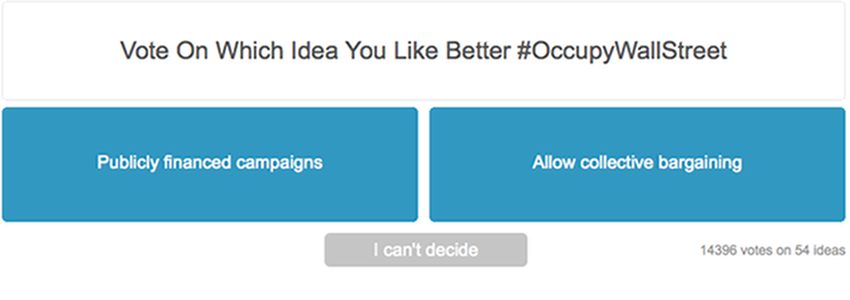author: Mark Belinsky
date: 2011-10-19 19:55:33+00:00
slug: occupyvotes-open-source-protest
title: ‘OccupyVotes: Democracy In An Open Source Protest’
wordpress_id: 3476
categories:
What is an open-source protest (or in Egyptian nomenclature, a wiki-revolution)? Can technology tools be used to develop new methods of distributed grassroots decision-making? It’s clear that the Occupy movement is about something much bigger and greater than one person or group … how can the large numbers of people who identify with the movement contribute to decision-making?
The past few weeks I have been spending time in Zucotti Park as part of the people’s microphone. Since tech-based amplification is banned, people have improvised, and together shout the words of whoever is speaking until it is loud enough so that everyone can hear them. That decision making is slow and laborious, while also beautiful and egalitarian.
"What do the protesters want?" is an oft-repeated chorus coming from mainstream media.
OccupyVotes is an open source approach to encourage participatory decision-making: collect & prioritize our ideas in an open, efficient & accountable way.
With around 10,000 votes in the first 36 hours of launching the site, it’s exciting to see the project taking off. It’s clear that this platform helps fill a void – people want to share their vision for demands for the Occupy Wall Street movement.
Occupy Votes was built on the open-source All Our Ideas platform. Not only does it allow visitors to vote with the ideas they like best, it provides them a forum to submit their own ideas and see the votes by other users. As more people contribute their ideas, we look forward to taking a deeper look at the data to understand the differences between opinions from those voting inside Liberty Park, in other US cities, from different platforms and around the world. Stay tuned to find out what the data has to say about the decision making process.
It’ll be interesting to get deeper into the data to understand the differences between opinions from those voting inside Liberty Park, in other US cities, from different platforms and around the world. Stay tuned to find out what the data has to say about the decision making process.
Why did we choose All Our Ideas? Other platforms exist, including Google moderator. With that system, good ideas often get stuck at the bottom of the laundry list and tend not to rise, unless a troll forces an issue up. People don’t tend to scroll. Or trolls will upvote only the issues that they’re interested in, not the rest. This creates lopsided results. Plus, this tool is easy to use and visually clear. The user interface is itself more democratic in that way.
All Our Ideas randomly generates a pairing. As more and more people vote, the information can become statistically representative and truly reflect the interests of the group. Or points of disagreement. All of that information is available in the data, which is open and available. We’ll be publishing it in the interest of transparency.
We’re looking to gather volunteers to set up a voting booth in Liberty Plaza (Zuccotti Park) and engage people in the process of voting and presenting their specific demands. This site is an initial attempt to see if the tool speaks to people. Digital Democracy has had some initial successes with this with our friends in Egypt, Tunisia and Morocco, and I’m hoping we can take the lessons and open source tools we’ve been working with around the world to continue to support the marginalized, even in this country – the 99%.
We welcome your thoughts, feedback and – of course – your ideas!
Disclosure: All of the ideas on the allourideas site are currently seeded from unscientific polls that I’ve seen covered in a variety of media sources. Fast Company, CNN, WSJ & occupywallstreet forum, plus Michael Haack and Matt Taibbi. Additional ideas related to financial concerns have been added by users. Thanks to the Meetup team for providing their headquarters in New York City for the Occupy Together Hackathon where this project was synthesized.
Update: Check out this Mashable article which talks about the project – Occupy Wall Street Hackathons Produce Digital Tools and New Activists and on the All Our Ideas blog.
